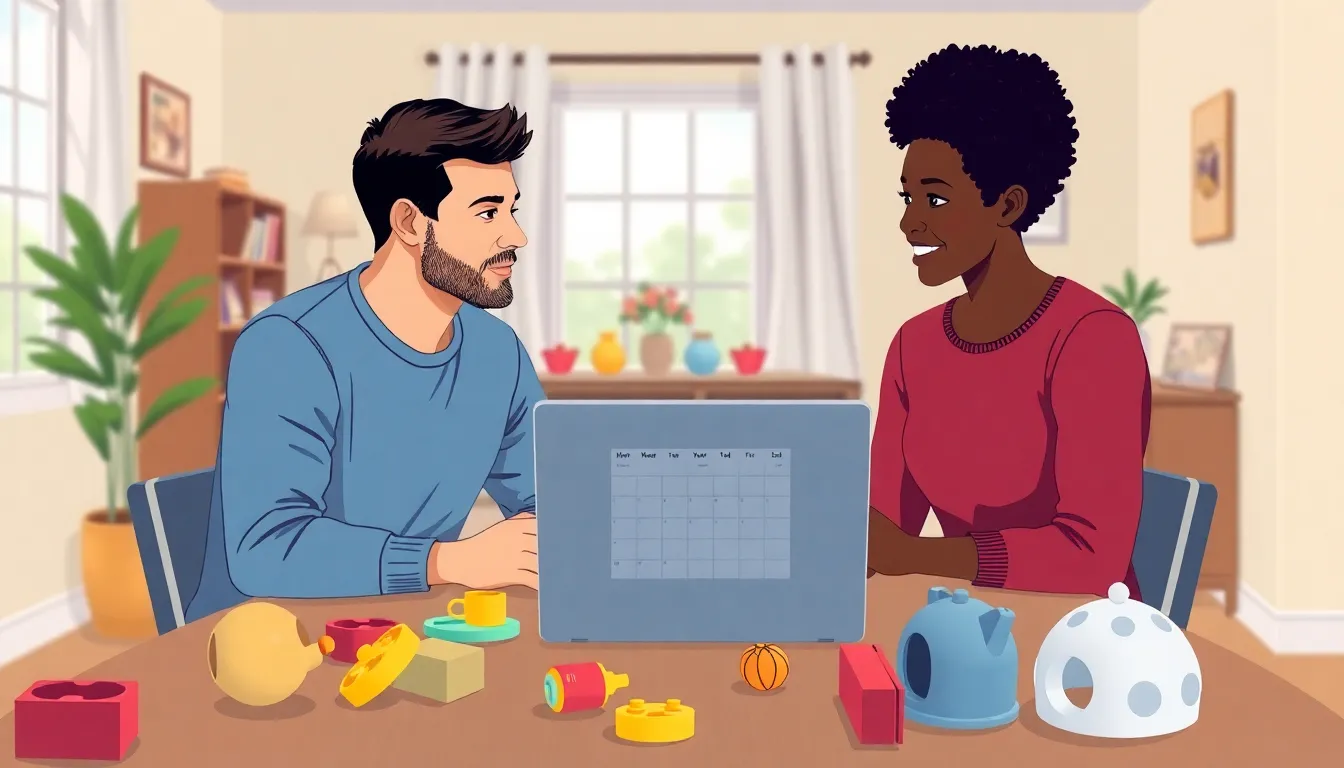Table of Contents
ToggleDivorce might feel like the end of the world, but when kids are involved, it’s just the beginning of a new adventure called co-parenting. Picture this: two people who once shared a life are now sharing a calendar, juggling schedules like circus performers, and trying to keep the peace—without a single clown nose in sight. It sounds like a recipe for chaos, but with the right approach, it can actually be a smooth ride.
Co-parenting after divorce isn’t just about surviving; it’s about thriving for the sake of the kids. It’s about turning awkward exchanges into opportunities for teamwork and navigating the ups and downs with humor and grace. With a dash of patience and a sprinkle of communication, co-parents can create a nurturing environment that helps their children flourish, proving that even after a split, family can still be a beautiful, albeit unconventional, masterpiece.
Understanding Co-Parenting After Divorce
Co-parenting can seem challenging after a divorce, yet it holds significant potential for a positive family dynamic. Emphasizing cooperation and support leads to a healthier environment for children.
Definition of Co-Parenting
Co-parenting refers to the shared responsibility between divorced or separated parents for raising their children. Each parent collaborates on education, healthcare, and daily activities. Effective co-parenting encompasses communication and decision-making that prioritize children’s needs. It promotes stability and routine, ensuring children feel supported by both parents. Such arrangements can include flexible schedules that accommodate each parent’s commitments while remaining attentive to the emotional and social development of the children.
Importance of Effective Co-Parenting
Effective co-parenting plays a crucial role in minimizing stress for children. When parents display unity and mutual respect, kids adapt better to the changes in their family structure. Communication lays the foundation for resolving conflicts and addressing issues as they arise. Children benefit emotionally when parents work together, providing consistent guidance and support. Structure contributes to feelings of security, allowing children to thrive in both environments. Strong co-parenting relationships also encourage positive interactions, which can significantly impact children’s overall well-being.
Strategies for Successful Co-Parenting

Successful co-parenting relies heavily on effective communication and thoughtful planning. Parents navigating this journey can create a supportive environment that fosters children’s emotional well-being.
Communication Techniques
Establishing clear communication methods strengthens co-parenting. Utilize texts or emails to coordinate schedules and share updates. Use tone and phrasing that promotes positivity and respect. Prioritize regular check-ins to discuss children’s needs, ensuring both parents stay informed. Focus on active listening to understand each other’s perspectives. Avoid discussing sensitive topics in front of children to protect their feelings. Practice empathy and patience during disagreements; seek solutions rather than blame. Maintain a shared calendar for activities and appointments to minimize misunderstandings.
Creating a Co-Parenting Plan
A co-parenting plan acts as a roadmap for collaboration. Define custody arrangements clearly, outlining residential schedules for weekdays and weekends. Specify holiday arrangements to ensure fairness and completeness. Address decision-making authority regarding education, healthcare, and activities, ensuring both parents have input. Include a conflict resolution process to manage disagreements effectively. Regularly review and adjust the plan as children’s needs change. Incorporating flexibility within the structure fosters cooperation and reduces stress. Documenting these aspects helps maintain consistency and transparency for everyone involved.
Navigating Challenges in Co-Parenting
Co-parenting presents unique challenges. Awareness of potential conflicts and varying parenting styles contributes to creating a supportive environment for children.
Dealing with Conflict
Conflict arises in co-parenting relationships. Maintaining open communication serves as a primary strategy in resolving disagreements. Directly addressing issues often leads to quicker resolutions. Parents should focus on the children’s best interests, rather than personal grievances. Regular check-ins can facilitate productive discussions. Utilizing a mediator may help if conflicts escalate. Keeping conversations respectful and focused often minimizes tension and supports cooperative engagement.
Managing Different Parenting Styles
Different parenting styles frequently lead to discrepancies in co-parenting. Recognizing and respecting individual approaches fosters understanding. Establishing common ground can create a unified front for the children. Parents might discuss their values and expectations, allowing for smoother transitions between households. Flexibility often enhances cooperation, enabling both parents to adapt when necessary. Sharing resources or strategies may also benefit children by providing consistency in their routines. Balancing distinct styles promotes a nurturing environment for children to thrive.
The Role of Professionals in Co-Parenting
Professionals play a vital role in facilitating effective co-parenting after divorce. They help parents navigate challenges and foster healthier communication for the benefit of children.
Mediation and Counseling
Mediation serves as a valuable resource in resolving conflicts. Understanding emotions helps parents reach agreements on custody and visitation schedules. Counselors provide strategies designed to enhance communication and address underlying issues. Professionals can assist with setting ground rules for interactions, which simplifies discussions about children’s needs. Establishing clear guidelines minimizes misunderstandings and develops a unified front. Overall, mediation and counseling support emotional well-being and contribute to a more harmonious co-parenting experience.
Support Groups for Co-Parents
Support groups offer a sense of community for co-parents facing similar challenges. Sharing experiences provides empathy and understanding among participants. Interaction within these groups often leads to the exchange of practical tips for managing co-parenting dynamics. Parents find that learning from others can ease the transition post-divorce. Engaging in discussions about parenting styles fosters a collaborative mindset. Ultimately, support groups empower co-parents to create nurturing environments for their children.
Co-parenting after divorce can be a transformative journey that fosters growth for both parents and children. By focusing on effective communication and collaboration, co-parents can create a supportive environment that prioritizes their children’s well-being. Embracing flexibility and understanding differing parenting styles can ease transitions and reduce stress.
Utilizing resources like mediation and support groups can further enhance the co-parenting experience, allowing parents to navigate challenges with confidence. Ultimately, a positive co-parenting relationship not only benefits the parents but also cultivates a nurturing atmosphere in which children can thrive.




